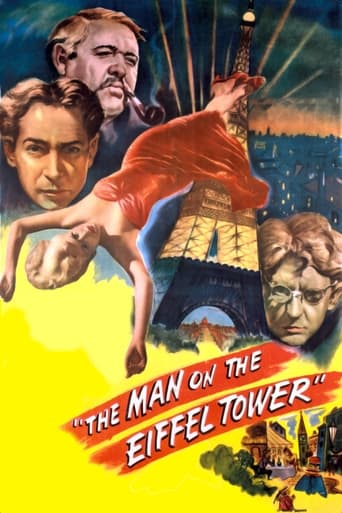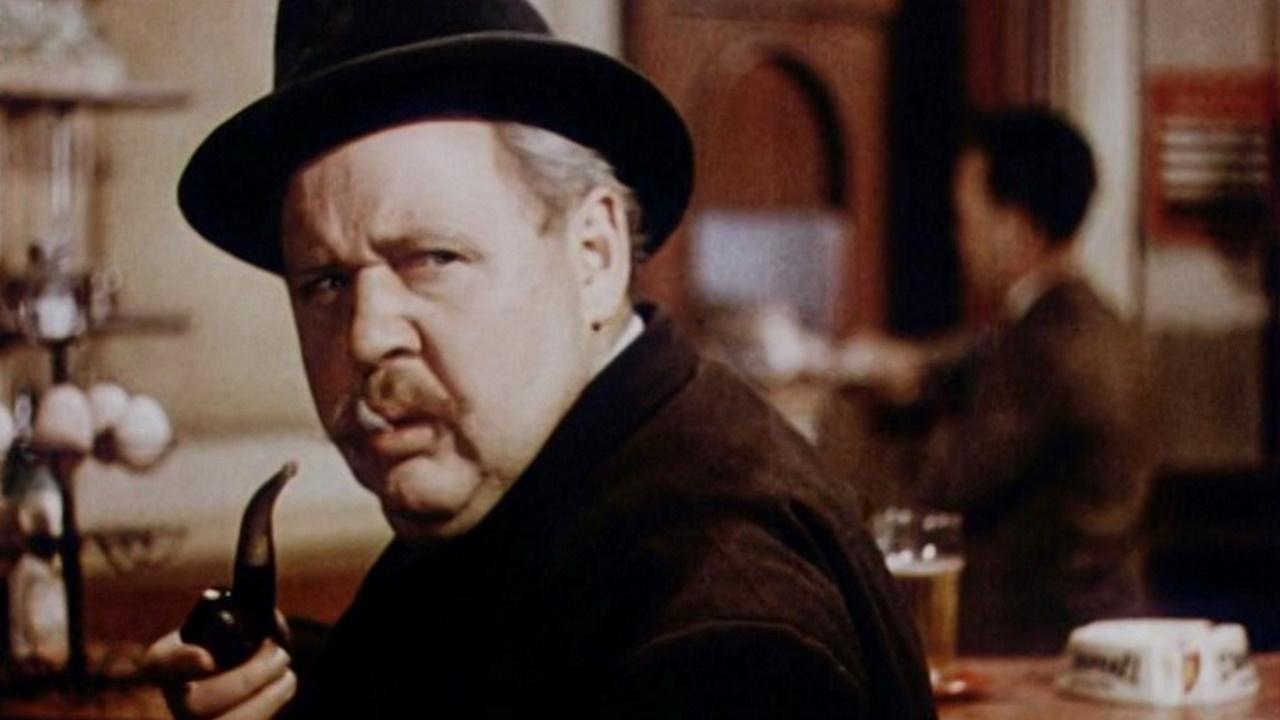trevorwomble
I found this film a real mixed bag. Firstly there is the jaunting use of colour. It has been well documented that the negative is long lost and only two 35mm film prints of varying quality are known to have survived (the DVD is made from the best elements combined from both these prints). The film print is still quite scratched and dark in places and could probably do with a proper digital restoration but at least it is watchable, if not as easy on the eye as technicolor is.I'm not going to go into plot details as others have already done that but I did find the film starts off quite well before the plot starts to sag quite badly in the middle and gets overly complicated, although it does pick up again towards the end when Maigret's plan starts to come together leading to the action packed finale. Also, despite receiving a major credit, Wilfrid Hyde White is in the film for one scene only so its more of a cameo than anything else.I found the dialogue to be hugely artificial at times making it sound like bad acting rather than decent actors trying to say some rather wooden lines. Yet Maigret himself is quite wonderfully acted by Charles Laughton who plays the role just right. Whereas some of the other characters seem very contrived, Maigret has a wonderful sense of humanity and believability as a middle aged, rather rotund detective who is actually smarter than he lets on. In fact Laughton's interpretation is not a million miles away from Michael Gambon's portrayal for television 40 years later. His sense of calm and intelligence, patiently waiting for his arrogant suspect to make a mistake, is reminiscent of Peter Ustinov's unruffled Hercule Poirot.A final word should go to the production values. Shot on the streets of Paris this film is an interesting view of how post war Paris looked, showing both the beauty of the city and the damage from the war that had finished 4 years earlier. Burgess Meredith was asked to take over directing the film three days into filming and to be fair he does a decent job, keeping the camera moving when it needs to and ensuring the audience know this is not filmed on a backlot in Hollywood. The sound is also beautifully clear too, a hard job when you consider the amount of location work involved.All in all this film falls short of being a genuine classic due to a muddled and flabby script, bad dialogue (in places) and some overacting by some of the supporting cast. However its still has a lot going for it and is well worth a watch for Laughtons performance alone.
Richard Burin
The Man on the Eiffel Tower (Burgess Meredith, 1949) is really, really odd, perhaps due to the troubled production, with Irving Allen replaced by Meredith and future Night of the Hunter director Charles Laughton taking charge of the scenes featuring his co-star. The story is fragmented and the direction wildly erratic - sometimes vividly expressionistic, at other times consisting of the cast simply standing in a big line - but at least we've got a restored copy now. Previous touring prints had degraded to such an extent that they had turned sepia, except for Meredith's bright red hair. The plot sees manic depressive Franchot Tone - yes, apparently bipolar disorder is the same as megalomania if you've got it not only in your heart, but "also up here" (I have no idea) - repeatedly taunting useless detective Inspector Maigret (Laughton) en route to a climactic confrontation up Le Tour Eiffel. Laughton is lacklustre, Meredith peculiar and Tone looks about 108 - his grey hair dyed chestnut - though he's quite effective in a one-note role. English leading lady Patricia Roc is also among the bafflingly illustrious cast, but she's given virtually nothing to do. The real star is the Ansco Color photography (unsung MGM masterpieces Kiss Me Kate and Brigadoon were two one of the few other films shot in the short-lived process) shot at sites around Paris, from the banks of the Seine to Les Deux Magots (an old haunt of Hemingway's) and the eponymous monument.
elli-roushanzamir
I was disappointed at the criticisms that this film inspired. So much of it is correct but not true. Admittedly I'm a huge fan of Georges Simenon in general & his Maigret novels in particular. The book A Man's Head, upon which this film is based, is one of the more intriguing, challenging and existential of the Maigret series. There are others; see The Tavern by the Seine. The film is similarly evocative: of Paris, 1949, of a weird mystery, of extremely odd characters--and some ordinary characters that involve themselves in extraordinary circumstance. The 1st time I watched the DVD I was distracted by the disintegrated production value, but not enough to refrain from recommending it to friends, to watching it repeatedly, to buy it as a b'day gift for a valued, long-term friend. I can only hope that the series of what are basically negative reviews won't discourage others from the pleasure of watching this film. And listed amongst the credits is indeed The City of Paris.
dbdumonteil
Few people know it,but it is actually a remake:Simenon's novel was already transferred to the screen in 1932 as "La tête d'un Homme" (A man's head) by Julien Duvivier.Although highly praised on the site ,I found Duvivier's movie confused and however he is my favorite French director.What partially redeemed this otherwise average movie was Inkijinoff's performance as Radek the intellectual gone mad and an unfriendly look at the bourgeoisie (in the remake the nephew can sleep the sleep of the just)When they remake a Duvivier movie,American producers have a tendency to use the Eiffel tower (see also Duvivier's "La Fete à Henriette" remade as "Paris when it sizzles" ) whereas they never go there in the French versions.The director seems more interested in Paris and its monuments than in his story which ,like Duvivier's script ,remains desultory and confused .I admire Franchot Tone (here credited as co-producer) some of his films are among my favorites ("Lives of a Bengal Lancer" "Three Comrades" "mutiny on the Bounty" also with Laughton)but his performance here is not really convincing.Taking the character to "les Deux Magots" ,the café for intellectuals which Sartre made famous is not enough to make us believe Radek has a high I.Q.Charles Laughton is also miscast as Maigret,and,most of the time ,he has nothing to do.The ending is ,admittedly,spectacular,but it 's only for the show.It does not bring anything to the film as a whole.


 AD
AD



